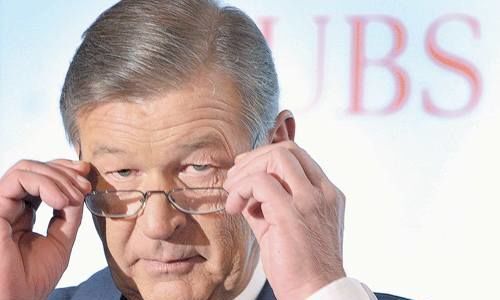Ex-UBS Chairman Marcel Ospel Dies
Marcel Ospel, the chairman of UBS until shortly before a 2008 Swiss government rescue, has died. He was 70. Ospel was eventually ousted after UBS was forced to repeatedly go cap in hand to shareholders as well as seek an injection from Singapore's sovereign wealth fund
Ex-UBS overseer Marcel Ospel stepped down in April of 2008, eight months before the Swiss-based bank was forced to take a bailout after more than $50 billion in crisis losses. He died after a prolonged battle with cancer, daily newspaper «Basler Zeitung» (in German only) reported first.
The mercurial Swiss banker had largely retreated from public life following UBS' fall from grace, after which he was considered a persona non grata in Switzerland. He is survived by his wife, Adriana Bodmer and their two children as well as four children from two previous marriages.
Merger Architect
Ospel's legacy is his 31-year career at UBS, where he began as an apprentice in 1977. He was the chief architect of the landmark merger between Union Bank of Switzerland (former UBS) and Swiss Bank Corporation (SBC), which is now UBS, in 1998.
Ospel was also instrumental in a long deal spree including Brinson Partners, GAM, Warburg, and O'Connor, the Chicago derivatives firm which brought wunderkind David Solo into the UBS fold. Ospel remained close to Solo, who ran GAM until 2015 and is now chairman of a Credit Suisse joint venture.
Seat of Power
Ospel climbed into the chairman's job from the CEO in 2001, handing over the top job to Peter Wuffli. Swissair went bust in the first year of Ospel's tenure as chairman – bringing the Swiss banker public anger for his perceived failure to extend the flagship carrier a line of credit.
As chairman, maintained tight control from behind the scenes via a so-called chairman’s office. In practice, this meant that everyday operational decisions like big investment banking loans were vetted by Ospel and two close associates, Stephan Haeringer and Marco Suter – to whom he also remained close until his death.
Crisis Cash Injections
Ospel was eventually ousted after UBS was forced to repeatedly go cap in hand to shareholders as well as seek an injection from Singapore's sovereign wealth fund. The bank took years to stanch its crisis-era withdrawals and recover from damaging tax probes.
It also spent the post-crisis years setting aside scandals including rigging foreign exchange and metal markets as well as Libor, the then-benchmark interest rate. Ospel, reportedly worth north of $150 million, emerged as a private investor, including in fintech firm Evolute.





















